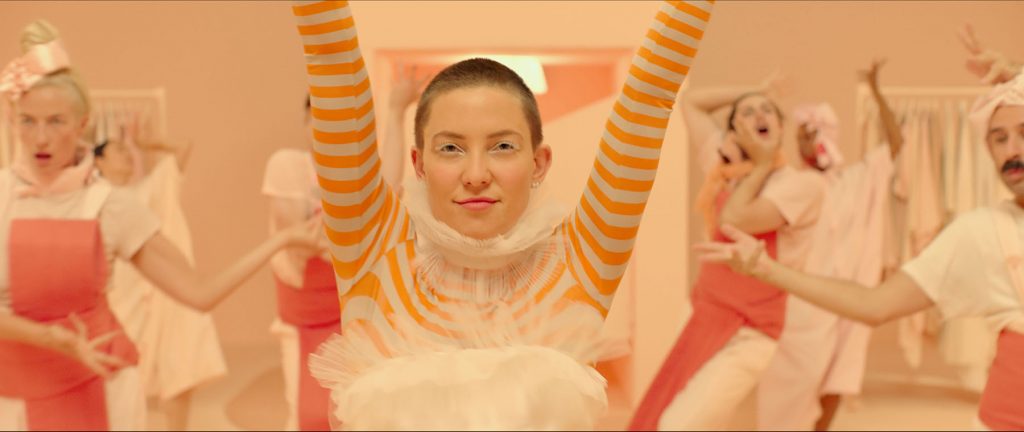Featuring gorgeous music videos and great songs, Sia’s Music uses many familiar tropes to tell a story that isn’t really about its neurodiverse titular character.
It wouldn’t be possible to talk about Music without acknowledging the recent controversies surrounding it. The film is the directorial debut of internationally acclaimed singer-songwriter Sia, who also co-wrote its screenplay with children’s book author Dallas Clayton. Ever since the release of its first trailer in November 2020, the Australian pop icon has been under scrutiny for her decision to cast neurotypical actor and long-time collaborator Maddie Ziegler for the titular role of Music, a nonverbal teenager on the autism spectrum who suddenly finds her routine turned upside-down when her beloved grandmother unexpectedly dies, and her newly sober, drug-dealing, estranged half-sister becomes her new guardian.
Though Sia has been criticized for months by activists and people on the autism spectrum for what is still considered to be, by many, an ableist casting choice, the debate took on a new dimension last Wednesday, when the film scored two Golden Globes nominations, including one for Best Picture – Musical/Comedy. An online petition on change.org was launched last Friday, asking to cancel Music‘s release, and it has now collected nearly 20,000 signatures. Sia has apologised, first clarifying that she did try working with an autistic person before casting Ziegler, and realised how “unpleasant and stressful” an experience it had been for that person. Then, as reported by Variety, she explained that future public screenings of Music will begin with a warning that will make it clear that the film “in no way condones or recommends the use of restraint on autistic people“, and that those specific scenes will also be removed. Sia has also made the decision to cancel her Twitter account, and the debate is still very much ongoing.
With all this in mind, I watched the film ready to form an opinion on whether or not Sia made the right call when she cast her muse as the movie’s protagonist, and, above all, on whether or not I agreed with the criticism on the film’s portrayal of neurodiversity. I certainly have many thoughts on both, of course, starting from the fact that, even though I don’t think Sia was fully aware of just how unfortunate her casting choice was, it was definitely not the right one to make: not only is the film’s portrayal of autism flawed to say the least, but Ziegler, who is an exceptional dancer, is also perhaps not as experienced and effective as an actor here. However, I also find myself in the position of having to raise an entirely different point.

When it comes to analysing Music‘s flaws, it’s not just a matter of whether or not the film’s depiction of autism is accurate: the real issue is that, though the movie is centred and even takes its name from a nonverbal teenager who’s on the low-functioning side of the autism spectrum, it doesn’t seem to care about exploring who she really is, nor does it attempt to raise awareness on neurodiversity.
At the beginning of the film, very little time is spent introducing the character: all we know is that her grandma arranges her eggs in the shape of a smile in the morning, and lets her take walks in the neighborhood that are pretty much as realistic and meaningful as Belle’s “Bonjour” routine in Beauty and the Beast. When Music’s grandma suddenly dies, her friendly neighbour George (Hector Elizondo, of Pretty Woman) promptly comes to the rescue, calling the police, who summons Music’s free-spirited half-sister Zu (Kate Hudson, of Almost Famous) in no time. When Zu begins to struggle in her attempts to look after Music, here comes another friendly neighbour, Ebo (Leslie Odom Jr., of Hamilton and One Night in Miami…), ready to help. As all this happens, interlaced with gorgeous but out of context music videos showcasing Sia’s new songs and signature style, the film loses track of its neurodiverse leading character completely, and uses Music as a way to shift its focus back to Zu and her (all-too-predictable) failed attempts to take care of her sister.
Which brings me to the film’s second flaw: Music is one of those movies that provide you with just the right amount of information the narrative needs to go forward. The film’s microcosm is made of very few characters, and each of them has a very specific role to play that verges into stereotype. There’s the self-destructive, recovering alcoholic who acts like a child and only learns to be a better person when she discovers family; there’s the friendly neighbour with a heart of gold; there’s the wise black character from a faraway land who’s there to help the white protagonist become a better person.
The time that isn’t spent on Music as a human being is used to showcase Sia’s new album instead, as the movie features ten musical numbers performed by the film’s cast that are often supposed to give us a glimpse into Music’s head. Though the pastel-coloured clips are as gorgeous and the songs as catchy as you’d expect them to be, these snippets often feel out of place, as they hardly ever cohesce with a narrative that isn’t focused on Music at all. It’s not surprising that the only musical number that feels coherent with the storyline is the one that doesn’t revolve around the film’s titular character: Leslie Odom Jr.‘s rendition of “Beautiful Things Can Happen” is both believable and affecting, as not only does it help the narrative move forward, but the actor – the film’s real standout – pours emotion and expressiveness into it.
Sia’s Music is a visually stunning film that features many great musical performances and successfully showcases Sia’s incredible new album. At the same time, it is also, unfortunately, a misfire, as not only does its depiction of neurodiversity feel inaccurate and, at times, even offensive, but its story lacks cohesion. Moreover, Ziegler, a wonderful dancer, lacks the necessary acting skills to pull off such a role, and the film’s flawed screenplay robs Music of any authenticity Kate Hudson and Leslie Odom Jr. would have been able to bring to their respective roles. Music is a missed opportunity, and perhaps a sign that the superstar should stick to what she does best – making the world fall in love with her exceptional music and style.
Music is now available to watch on digital and on demand.

